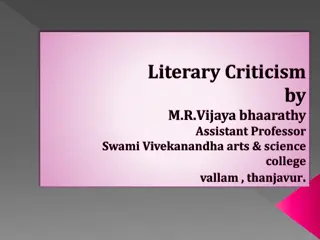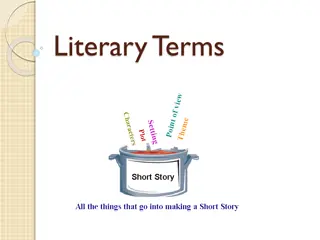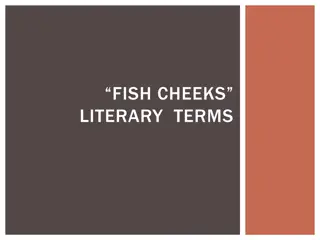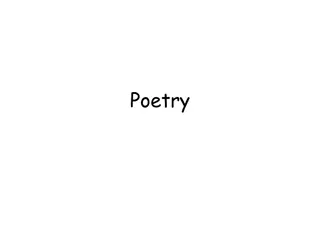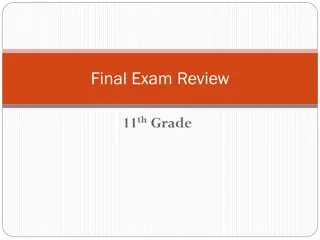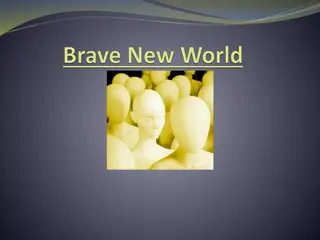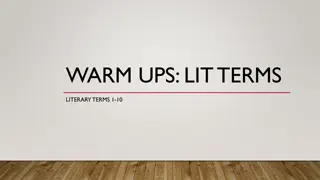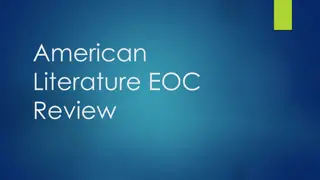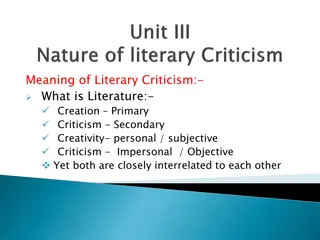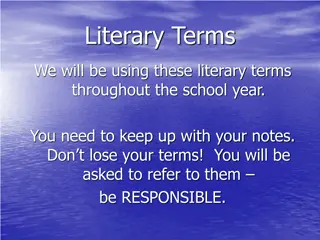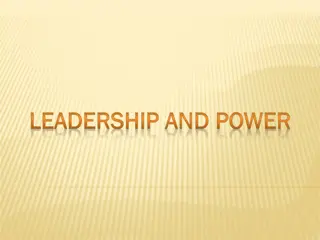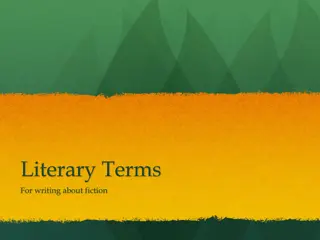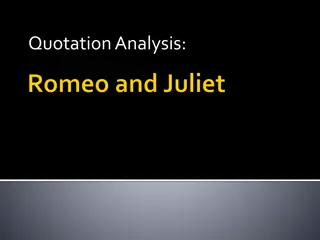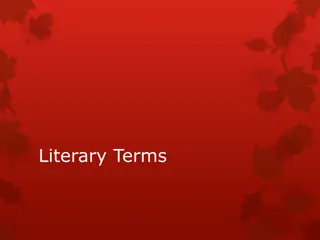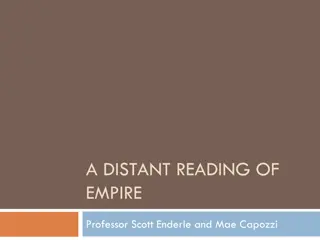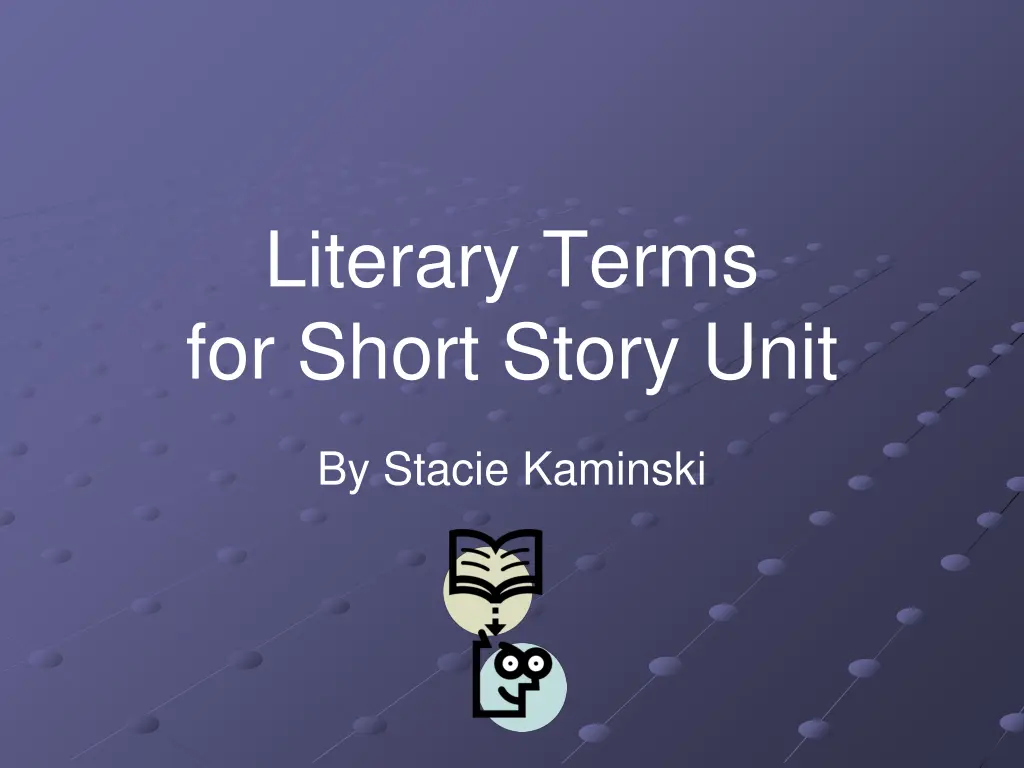
Literary Terms for Short Story Unit
Delve into the world of literary terms with this comprehensive guide by Stacie Kaminski. Explore concepts such as setting, characterization, denotation, connotation, allusion, plot, parts of a story, climax, and symbol. Enhance your understanding of storytelling elements and elevate your writing skills.
Uploaded on | 1 Views
Download Presentation

Please find below an Image/Link to download the presentation.
The content on the website is provided AS IS for your information and personal use only. It may not be sold, licensed, or shared on other websites without obtaining consent from the author. If you encounter any issues during the download, it is possible that the publisher has removed the file from their server.
You are allowed to download the files provided on this website for personal or commercial use, subject to the condition that they are used lawfully. All files are the property of their respective owners.
The content on the website is provided AS IS for your information and personal use only. It may not be sold, licensed, or shared on other websites without obtaining consent from the author.
E N D
Presentation Transcript
Literary Terms for Short Story Unit By Stacie Kaminski
SETTING: time and place of a story Establishes mood Can be source of conflict (person vs. nature) Illuminates the character (reveals strengths and weaknesses) Helps make fiction believable
Characterization Direct characterization - author TELLS us what the character is like Indirect characterization - reader figures out what a character is like by what the character says, thinks, and does as well as what other say about him / her and how he / she looks
DENOTATION The objective dictionary definition of a word. Frugal and cheap mean the same but one is more positive.
CONNOTATION The meaning, association, or emotion that a word suggests Robust vs. Fat Assertive vs. Bossy
ALLUSION (NOT allusion) A literary reference to something that the writer assumes the reader will be familiar with such as the Bible, Shakespeare, or mythology Sam was like the little boy who cried wolf.
PLOT A series of events that make up a story
Parts of a Story Exposition - introduces the setting, character and conflicts Rising Action - Complications to the problem - challenges for characters Climax - crisis / turn point / high point (more on this on the next slide) Falling Action - follows the climax, answers questions Resolution - conflict is resolved and ends
CLIMAX The turning point / crisis or the moment of greatest intensity which occurs near the end of story which helps determine the outcome of the conflict It is often marked by a significant action, even a moment of violence. In Romeo and Juliet the climax comes right before they both kill themselves.
SYMBOL Person, place, thing, or event that stands for both itself and for something else Apple education Rainbow hope Black cat bad luck
FORESHADOWING The use of clues to hint at events that will occur later in the plot In Romeo and Juliet Romeo s death is foreshadowed when he says he had a dream that he died an untimely death.
INFERENCES Something that is not directly stated but is hinted at or revealed indirectly - based on hints or clues Inferences focus the present where foreshadowing gives hints or clues about the future. In Make Lemonade it says Jolly s door has three locks on it. This hints that it is a high crime neighborhood.
CONFLICT The struggle between two opposing forces which can be internal or external PERSON vs. PERSON (Tim insults Mary) PERSON vs. SELF (internal conflict should I stay out late?)
CONFLICTS CONT. PERSON vs. NATURE (blizzard when driving home) PERSON VS. SOCIETY (school system, legal system, etc.)
IMAGERY Language which appeals to the senses as it describes the sights, sounds, textures, and smells in the story creating a picture w/ words He would tell his mother how it smelled: mud and algae and cattle manure and chlorophyll
THEME The central idea or insight revealed by the story - expression about point of view of life It is a general lesson we can apply to our own lives. Sometimes it is revealed through mistakes of the characters. R&J: Don t act impulsively. Themes are stated in general terms and don t mention characters names or actions.
IRONY The contrast or difference between expectations and reality may be verbal (things said), situational (things that occur), etc. Note paradox and oxymoron are sisters to irony The president of MADD gets arrested for drunk driving. A tornado strikes an outdoor theater when the movie Twister is playing.
PROTAGONIST the main character in a piece of fiction which is involved in the main conflict Odysseus from The Odyssey is a protagonist.
ANTAGONIST The character or force that comes into conflict with the protagonist. The protagonist is rarely all good and the antagonist is rarely all bad. Tybalt is an antagonist in Romeo and Juliet.
ANTONYM Words that have opposite meanings Kind, Cruel Healthy, Sick Generous, Greedy
SYNONYM Words that have similar meanings Loving, Caring Satisfied, Fulfilled Deceitful, Untruthful
POINT OF VIEW The vantage point from which the story is being told FIRST PERSON (I made the winning shot.) THIRD PERSON (Matt made the winning shot.) Narrator outside the story but can NOT see into the minds of the characters OMNISCIENT all knowing so it can reveal inner thoughts, feelings (Matt was nervous as he released the basketball.)
ONOMATOPOEIA The use of words whose sounds imitate their meaning Drip, gurgle, bang, buzz, honk Snap, crackle, pop, thud, sizzle
SIMILE A comparison between two unlike things using like or as The slowly moving and ever changing clouds were like a giant lava lamp in the sky.
METAPHOR Comparing two unlike things saying that one thing literally is something else Her positive attitude was a refreshing rain which rejuvenated everyone in her presence. She lifted her concrete hands as she wearily finished the task.
ALLITERATION The repetition of the same sound at the beginning of the word long lost love Her sweet smile made my heart swell.
PERSONIFICATION Giving human like characteristics to animals or non-living things. The leaves danced in the wind. The birds gossiped in the morning air.





